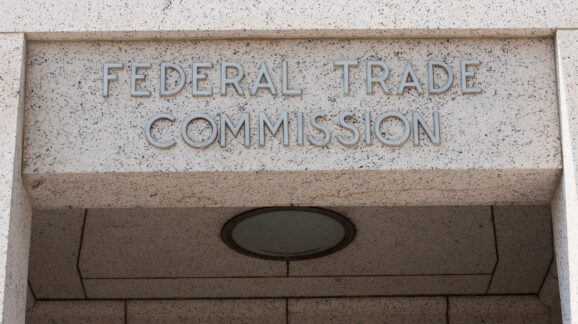Lina Khan’s Failed FTC Experiment
Bad management, poor strategy and disregard for norms have foiled her plan to refashion antitrust law.
President Biden has embraced modern progressivism and ditched his liberal economic-policy inheritance. Nowhere is this more striking than in competition policy—the past 40 years of which, Mr. Biden says, have been a failed experiment. His complaint is the consumer-welfare standard, the nearly half-century bipartisan consensus that competition policy should be judged by whether consumers benefit from a given arrangement.
Today’s Democrats aren’t the first to argue that the Federal Trade Commission, now led by Lina Khan, needs drastic change. New leadership after the 1968 and 1980 elections argued the same. In a recent analysis for the Competitive Enterprise Institute, we compared Ms. Khan’s tenure with her predecessors’ from those two eras. The contrast is revealing.
The first era, beginning in 1970, dramatically reformed the FTC but went astray when its leaders ignored counsel from economists and judges. This included transforming the commission’s mission from providing rules of the road to attempting substantively to reshape the economy. The second era, beginning in 1981, returned the agency to its productive but more modest purpose and began the 40 years Mr. Biden decried.
By 1970, the commission had been universally vilified for underperforming. Critics often referred to it as the little old lady of Pennsylvania Avenue. By 1981, it was overreaching so much that critics labeled it the “national nanny.” In the following 40 years, the commission charted a new course and became widely respected as an international competition agency. Mr. Biden’s administration has taken it in yet another direction.
Leaders who want to make significant changes within the federal government are typically advised to deal carefully with career civil servants, the staff tasked with implementing the administration’s goals. Ms. Khan’s team has evidently thought little of such tact. Less than a week on the job, she ordered the commission’s staff to cancel all public appearances until further notice. Former Commissioner Rohit Chopra—a Khan ally, whose staff she chose for top agency jobs—openly aired his contempt for FTC staff, at times calling the commission a “backwater,” “lax” and “feckless.”
Such antagonism may stem from the belief that career staff would resist progressive change. Perhaps that’s why Ms. Khan was slow to engage with many of the commission’s most senior career staff on taking office. The staff have appeared to return the favor: In the Office of Personnel Management’s annual survey of employees, in 2020 the FTC performed best among comparable agencies when respondents were asked whether they have a high level of respect for their senior leaders—and whether such leaders “maintain high standards of honesty and integrity.” In 2021, the agency was the worst.
Ms. Khan assumed her position with ambitious goals. So far, however, she has lacked the careful planning her predecessors enlisted when they undertook similarly bold plans. New York magazine quoted a former official who said that Ms. Khan “came in with a bunch of answers . . . but no actual strategy” to achieve her goals given the commission’s legal authority and resources.
Part of that objective has been to restrain what Ms. Khan and her allies consider to be the excessive power of America’s major corporations. Achieving that aim is nearly impossible under existing law. Yet we see no evidence that the commission is adopting the brick-by-brick approach the 1980s-era FTC leadership took to win over the judiciary and realize its goals.
Rather than engage in careful legal research to effect transformation in the law, the commission has rushed into court and lost two of its most prominent merger cases. The FTC has sought to rewrite its procedures for rulemaking and recently promulgated one, to ban noncompete agreements, for which it likely lacks necessary authority.
Despite these defeats, the commission has plowed ahead. The FTC has sought to create disincentives to merge by increasing the cost and uncertainty of required preconsummation merger filings. The FTC investigates only 14% of proposed mergers and challenges 2%. It has proposed to increase the information required for all filings—even though the majority aren’t worth investigating.
The FTC has persisted in relentless norm-busting, beginning with Mr. Biden’s designating Ms. Khan as chair immediately after she was confirmed as a commissioner—without telling the Senate he intended to do so. It continued by limiting information available to minority commissioners, companies under investigation and Congress. Further, according to a designated agency ethics official, Ms. Khan became the first agency employee to ignore the advice that she recuse herself from participating in a specific party matter owing to “appearance or other federal ethics grounds.” Before joining the commission Ms. Khan had opined that Meta, one of the parties to a challenged merger, should be denied such acquisitions. She chose to participate anyway, and members of the commission sought to conceal her disregard for ethical guidance.
Norms are essential, particularly when people with strong but different opinions must work together. When they are undermined, so too are social and professional cohesion. Such is the case at Ms. Khan’s FTC. While the commission is certainly active, promulgating rules and filing lawsuits, the painstaking organization and planning necessary to make its efforts permanent are nowhere to be found. As legendary basketball coach John Wooden said, “Never mistake activity for achievement.”
Read the full article at The Wall Street Journal.
